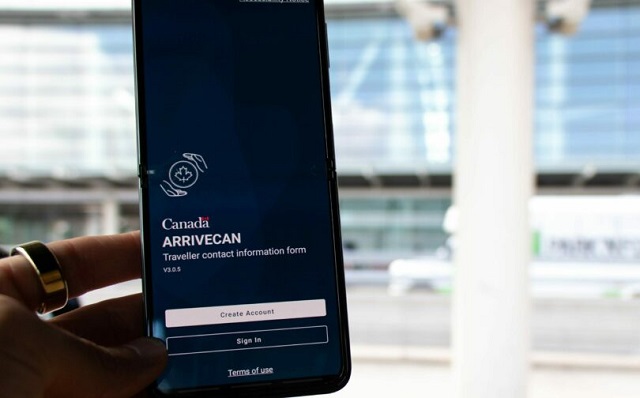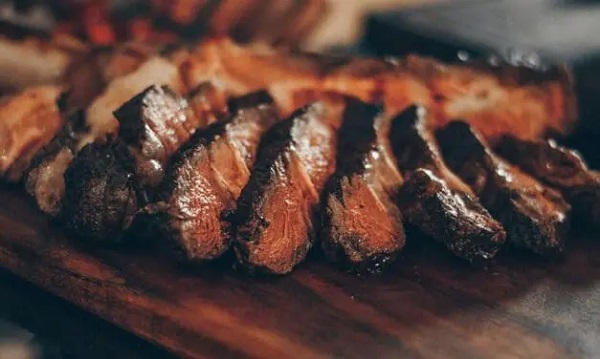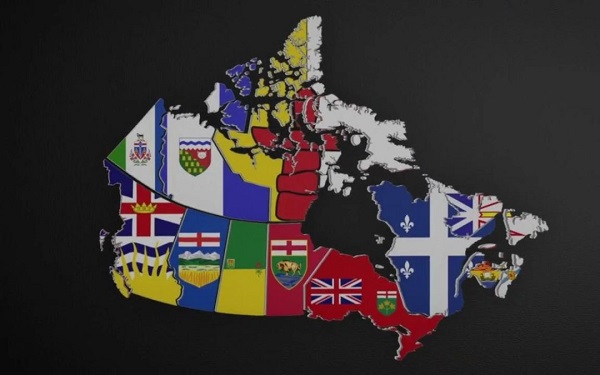COVID-19
Conservative MPs say gov’t agency ‘lied’ about sweetheart deals for Canada’s COVID travel app

From LifeSiteNews
MP Kelly Block said at a House of Commons government operations committee meeting that there ‘was misconduct’ and ‘very bizarre’ lapses concerning an $11.1 million contract awarded to a supplier.
Conservative Party of Canada (CPC) MPs accused the Canada Border Services Agency (CBSA) of lying to Parliament over sweetheart contracting approvals concerning the federal government’s $54 million controversial COVID-era ArriveCAN travel app.
As per Blacklock’s Reporter, CPC MP Kelly Block said recently at a House of Commons government operations committee meeting that there “was misconduct” from the CBSA along with “very bizarre” lapses concerning an $11.1 million contract awarded to supplier GC Strategies Inc.
“We have I think been misled and perhaps even lied to when it comes to the individuals knowing who in fact chose GC Strategies,” Block said.
The CBSA was tasked with building the ArriveCAN app.
The House of Commons Standing Committee on Government Operations and Estimates (OGGO) is investigating how various companies such as Dalian, Coaradix, and GC Strategies received millions in taxpayer dollars to develop the contentious quarantine-tracking ArriveCAN app.
Two weeks ago, LifeSiteNews reported that an investigation into ArriveCAN by Alexander Jeglic, the government’s procurement ombudsman, revealed that three-quarters of the contractors who were paid to work on ArriveCAN did not do anything in building the scandal-plagued app.
The investigation’s report singles out GC Strategies, saying the two-man company did not prove that its list of subcontractors was qualified to work on the app.
The procurement ombudsman’s report also found “numerous examples” in which GC Strategies “had simply copied and pasted” required work experience that was listed by the government for its contractors.
The report also noted that it was unusual the government used criteria for the app’s tender that were “overly restrictive and favoured” GC Strategies, which won the contract bid despite the fact no other bids were submitted.
Speaking to the government operations committee, Block observed, “Who actually chose GC Strategies?”
Jeglic testified to the committee that it was “highly unusual” GC Strategies got the bid to make ArriveCAN.
“It is impossible to demonstrate fairness if you do not have records demonstrating how you evaluated all of the bids,” he said, noting that open bidding is vital in being “fair, open and transparent.”
CPC MP Larry Block said it was time to “deal with the elephant in the room.”
“The elephant in the room is the expansion of outsourcing. Last year alone, $14.6 billion was spent on federal outsourcing,” he said.
Thus far, only two federal executives who worked on the ArriveCAN app have been suspended. The Royal Canadian Mounted Police are investigating the contractors who worked on the program.
Canadians were told ArriveCAN was supposed to have cost only $80,000, but the number quickly ballooned to $54 million.
As for the app itself, it was riddled with tech glitches along with privacy concerns from users.
ArriveCAN was introduced in April 2020 by the Trudeau government and made mandatory in November 2020. The app was used by the federal government to track the COVID jab status of those entering the country and enforce quarantines when deemed necessary.
When the app was mandated, all travelers entering Canada had to use it to submit their travel and contact information as well as any COVID vaccination details before crossing the border or boarding a flight.
Canadian Auditor General Karen Hogan announced an investigation of the ArriveCAN app in November 2022 after the House of Commons voted 173-149 for a full audit of the controversial app.
Last year, LifeSiteNews reported on two tech entrepreneurs testifying before the committee that during the development of the ArriveCAN travel app they saw firsthand how federal managers engaged in “extortion,” “corruption,” and “ghost contracting,” all at the expense of taxpayers.
COVID-19
Canadian veteran challenges conviction for guarding War Memorial during Freedom Convoy

From LifeSiteNews
When the convoy first came to Ottawa, allegations were floated that the memorial had been desecrated. After learning of this, Evely quickly organized a group of veterans to stand guard around the clock to protect the area.
A Canadian veteran appealed to the Ontario courts after he was convicted for organizing a guard around the National War Memorial during the Freedom Convoy.
In an October press release, the Justice Centre for Constitutional Freedoms (JCCF) announced that an appeal has been filed in the Ontario Court of Appeals on behalf of Master Warrant Officer (Ret’d) Jeffrey Evely over his conviction for mischief and obstructing police while on his way to guard the Ottawa War Memorial during the 2022 Freedom Convoy.
“By locking down large sections of downtown Ottawa, the police were effectively preventing all civilians from accessing public areas and greatly exceeded their powers under the common law,” constitutional lawyer Chris Fleury explained.
“This case raises issues that have implications for protests across the province and the country. We are hopeful that the Ontario Court of Appeal will agree and grant leave to appeal,” he added.
The appeal argues that police overstepped their authority in their response to the 2022 protest of COVID mandates. Police actions at the time included locking down the Ottawa core, establishing checkpoints, and arresting protesters.
In September 2024, Everly was convicted of mischief and obstruction after his involvement in the 2022 Freedom Convoy, which protested COVID mandates by gathering Canadians in front of Parliament in Ottawa.
As LifeSiteNews previously reported, when the convoy first came to Ottawa, allegations were floated that the memorial had been desecrated. After learning of this, Evely quickly organized a group of veterans to stand guard around the clock to protect the area.
However, under former Prime Minister Justin Trudeau’s use of the Emergencies Act, many parts of downtown Ottawa were blocked to the public, and a vigilant police force roamed the streets.
It was during this time that Evely was arrested for entering a closed off section of downtown Ottawa during the early hours of February 19, 2022. He had been on his way to take the 4:25 a.m. shift protecting the Ottawa War Memorial.
As Evely walked to the memorial, he was allegedly told to stop by police. According to the police, Evely “ran for a short distance before being confronted by two additional police officers.”
He was forcibly pushed to the ground, landing face first. The veteran was then arrested and charged with mischief and obstructing police.
At the time, the use of the EA was justified by claims that the protest was “violent,” a claim that has still gone unsubstantiated.
In fact, videos of the protest against COVID regulations and shot mandates show Canadians from across the country gathering outside Parliament engaged in dancing, street hockey, and other family-friendly activities.
Indeed, the only acts of violence caught on video were carried out against the protesters after the Trudeau government directed police to end the protest. One such video showed an elderly women being trampled by a police horse.
While the officers’ actions were originally sanctioned under the EA, Federal Court Justice Richard Mosley ruled that Trudeau was “not justified” in invoking the EA, forcing Crown prosecutors to adopt a different strategy.
Now, Crown prosecutors allege that the common law granted police the authority to stop and detain Evely, regardless of the EA.
However, Evely and his lawyers have challenged this argument under section 9 of the Canadian Charter of Rights and Freedoms, insisting that his “arrest and detention were arbitrary.”
Earlier this month, Freedom Convoy organizers Tamara Lich and Chris Barber were sentenced to 18-month house arrest after a harrowing 25-month trial process. Many have condemned the sentence, warning it amounts to “political persecution” of those who stand up to the Liberal government.
COVID-19
Freedom Convoy leader Tamara Lich says ‘I am not to leave the house’ while serving sentence

From LifeSiteNews
‘I was hoping to be able to drop off and pick up my grandsons from school, but apparently that request will have to go to a judge’
Freedom Convoy leader Tamara Lich detailed her restrictive house arrest conditions, revealing she is “not” able to leave her house or even pick up her grandkids from school without permission from the state.
Lich wrote in a X post on Wednesday that this past Tuesday was her first meeting with her probation officer, whom she described as “fair and efficient,” adding that she was handed the conditions set out by the judge.
“I was hoping to be able to drop off and pick up my grandsons from school, but apparently that request will have to go to a judge under a variation application, so we’ll just leave everything as is for now,” she wrote.
Lich noted that she has another interview with her probation officer next week to “assess the level of risk I pose to re-offend.”
“It sounds like it’ll basically be a questionnaire to assess my mental state and any dangers I may pose to society,” she said.
While it is common for those on house arrest to have to ask for permission to leave their house, sometimes arrangements can be made otherwise.
On October 7, Ontario Court Justice Heather Perkins-McVey sentenced Lich and Chris Barber to 18 months’ house arrest after being convicted earlier in the year convicted of “mischief.”
Lich was given 18 months less time already spent in custody, amounting to 15 1/2 months.
As reported by LifeSiteNews, the Canadian government was hoping to put Lich in jail for no less than seven years and Barber for eight years for their roles in the 2022 protests against COVID mandates.
Interestingly, Perkins-McVey said about Lich and Barber during the sentencing, “They came with the noblest of intent and did not advocate for violence.”
Lich said that her probation officer “informed me of the consequences should I breach these conditions, and I am not to leave the house, even for the approved ‘necessities of life’ without contacting her to let her know where I’ll be and for how long,” she wrote.
“She will then provide a letter stating I have been granted permission to be out in society. I’m to have my papers on my person at all times and ready to produce should I be pulled over or seen by law enforcement out and about.”
Lich said that the probation officer did print a letter “before I left, so I could stop at the optometrist and dentist offices on my way home.”
She said that her official release date is January 21, 2027, which she said amounts to “1,799 days after my initial arrest.”
As reported by LifeSiteNews, Lich, reflecting on her recent house arrest verdict, said she has no “remorse” and will not “apologize” for leading a movement that demanded an end to all COVID mandates.
LifeSiteNews reported that Conservative Party leader Pierre Poilievre offered his thoughts on the sentencing, wishing them a “peaceful” life while stopping short of blasting the sentence as his fellow MPs did.
In early 2022, the Freedom Convoy saw thousands of Canadians from coast to coast come to Ottawa to demand an end to COVID mandates in all forms. Despite the peaceful nature of the protest, Trudeau’s government enacted the never-before-used Emergencies Act (EA) on February 14, 2022.
-

 Alberta2 days ago
Alberta2 days agoFrom Underdog to Top Broodmare
-

 Business2 days ago
Business2 days agoCanada’s economic performance cratered after Ottawa pivoted to the ‘green’ economy
-

 Business1 day ago
Business1 day agoBank of Canada governor warns citizens to anticipate lower standard of living
-

 Business2 days ago
Business2 days agoCanadians paid $90 billion in government debt interest in 2024/25
-

 International22 hours ago
International22 hours agoSagrada Familia Basilica in Barcelona is now tallest church in the world
-

 Agriculture21 hours ago
Agriculture21 hours agoCloned foods are coming to a grocer near you
-

 International2 days ago
International2 days agoNetanyahu orders deadly strikes on Gaza with over 100 dead despite ceasefire deal
-

 Fraser Institute22 hours ago
Fraser Institute22 hours agoOttawa continues to infringe in areas of provincial jurisdiction



